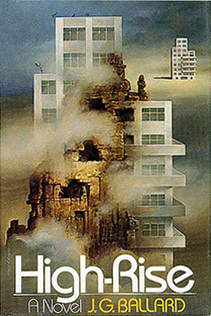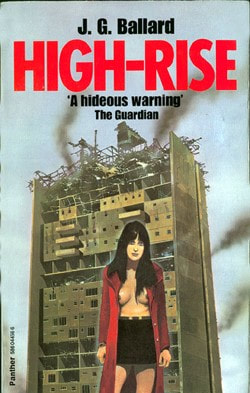|
By Rick McGrath
A night patrol creeps along a dark hallway past a barricade of desks; a flash of white birds leap into the air like a fluttering flag of surrender; a dog lies drowned in the middle of a community pool... welcome to High-Rise, JG Ballard's deeply subversive study of a society in transformation.
J.G. Ballard has often told interviewers that his characters all seek a kind of highly personal psychic salvation, and that they will, if necessary, create their own self-defining mythologies and pursue them to their furthest logical ends, no matter how illogical it seems, or what the cost.
The seeming irrationality of it all is, of course, just part of Ballard's modus operahndi. As he told Greame Revell in 1983, "I would say that a lot of my fiction is, if you like, open-ended. I leave for the reader to decide what the moral and psychological conclusions to be drawn from my fiction should be. For example, in the case of Crash, High-Rise and The Atrocity Exhibition, I offer an extreme hypothesis for the reader to decide whether the hypothesis I advance (this extreme metaphor to deal with an extreme situation) is proven." In High-Rise, Ballard has created an isolated environment for the close study of how an ultra-modern apartment block can transform its denizens into a new, aggressive society based on the premise that living in a motherly machine will allow your neurons to re-wire into whatever psycho state you've been unconsciously repressing in the "real" world -- that place Ballard believes is the ultimate fiction. We have a story of transformation here, ladies and gentlemen, and aficionados of the bizarre and disaffected -- those looking for obsessive, outlandish social mayhem -- will not be disappointed: High-Rise has 40 storeys of shock corridor ahead. The premise is fascinating: just after the last property in a 1,000-suite tower is occupied, the first little signs of social change begin to become public. A party is in progress. A wine bottle crashes and smashes all over a resident's balcony. Soon crazed, drunken, mob-mentality parties are breaking out all over the building, and now we're deeply into the action, led in shocked wonder as Ballard brilliantly describes the metamorphosis of group psychopathological desire into a new kind of childlike urban social model, a twisted adult mirror of Lord Of The Flies, with no resolution to any kind of recognizeable reality principle. The Low-Down On The High-Rise.
Variously described as a spaceship, or a "Pandora's Box whose thousand lids were one by one opening inward", this giant housing structure is a marvel of technologies which Ballard credits for "freeing" its occupants. How can it do this? As a sort of giant robot "mother", the building has been designed to cater to all the physical needs of its occupants. But what of their psychological needs?
It is basically an isolation tank for 2,000 people, and as in Concrete Island, this removal from "exterior" social reality unfetters repression. Never one to worry much about scientific "proof", Ballard simply informs us, "the building took away the need to repress anti-social behavior." Like a seatbelt perversely gives you the freedom to drive faster. On the level of characterization the building is, in Ballard's oddly amoral universe, a mindless liberator, an assembly of services, "a model of all that technology had done to make possible the expression of a truly free psychopathology". This is what Ballard means by "extreme metaphor". No longer a simple building, it is in reality a "huge machine designed to serve, not the collective body of tenants, but the individual resident in isolation." By opening up the necessary neural pathways to the reckless exploration of psychopathic desires, the high-rise allows this enclave of competitive, middle and upper class worker bees to sucumb to the demands of their inner needs, which, in this case, is explored in the physical acting-out of all the dark, driven activites of the lives of three of the high-rise occupants. It is important to realize, however, that the building itself is the metaphor. High-Rise is a machine coddling a community, yet still catering to each individual's every whim. How might you react if this urban eden suddenly rejected you and your fellow population? The old social rules are quickly replaced, and individuals revert to inner cunning and extreme behaviour. How do you understand High-Rise as an extreme metaphor? It could be tricky, because Ballard tends to be "open-ended" insofar as specific meaning is concerned. High-Rise represents a wide variety of themes -- social, political, psychological. Is it society, just waiting to regress, given the right circumstances? The state of politics, as the occupants divide themselves along class lines? Is it a Skinner Box on end, as Ballard explores the depths to which obsessions will reach? Some twisted variation of Lunghwa Internment Camp in Shanghai, where Ballard spent three years as a youth and witnessed unthinkable social upheaval while learning how to survive in a suddenly hostile environment? Probably all of the above. It soon becomes apparent what really interests Ballard are the abnormal antics of the high-rise inhabitants. Very quickly in the story the building becomes the landscape generated by the fears and anxieties, aggressions and hates, schemes and capitulations of the dwellers within. Its condition and usefulness is reflected the various mindscapes of the protagonists. Q: Who Are These People?
|
Steven Craig Hickman - The Intelligence of Capital: The Collapse of Politics in Contemporary Society
Steven Craig Hickman - Hyperstition: Technorevisionism – Influencing, Modifying and Updating Reality
Archives
April 2020
|




 RSS Feed
RSS Feed
